Transformational Leadership Approach for New Registered Nurses
VerifiedAdded on 2022/10/11
|13
|3668
|293
Report
AI Summary
This report delves into the significance of transformational leadership within nursing practice, specifically for newly registered nurses. It begins by introducing the concept and its core characteristics, emphasizing the leader's role in inspiring and motivating team members to foster creativity and drive organizational success. The report then analyzes the impact of transformational leadership on critical aspects of nursing, including communication, documentation, teamwork, professional relationships, scope of practice, delegation of care management, and the overall quality of healthcare. It highlights how this leadership style enhances communication skills, builds cohesive teams, improves patient outcomes, and supports the professional development of new nurses. The report concludes by underscoring the effectiveness of transformational leadership, particularly in situations requiring improvement or significant changes within the healthcare setting, making it an invaluable approach for newly graduated nurses as they establish their careers.

Assignment Name Student ID
Assignment Name
Student ID
28 Sep 2019
1 | P a g e
Assignment Name
Student ID
28 Sep 2019
1 | P a g e
Paraphrase This Document
Need a fresh take? Get an instant paraphrase of this document with our AI Paraphraser
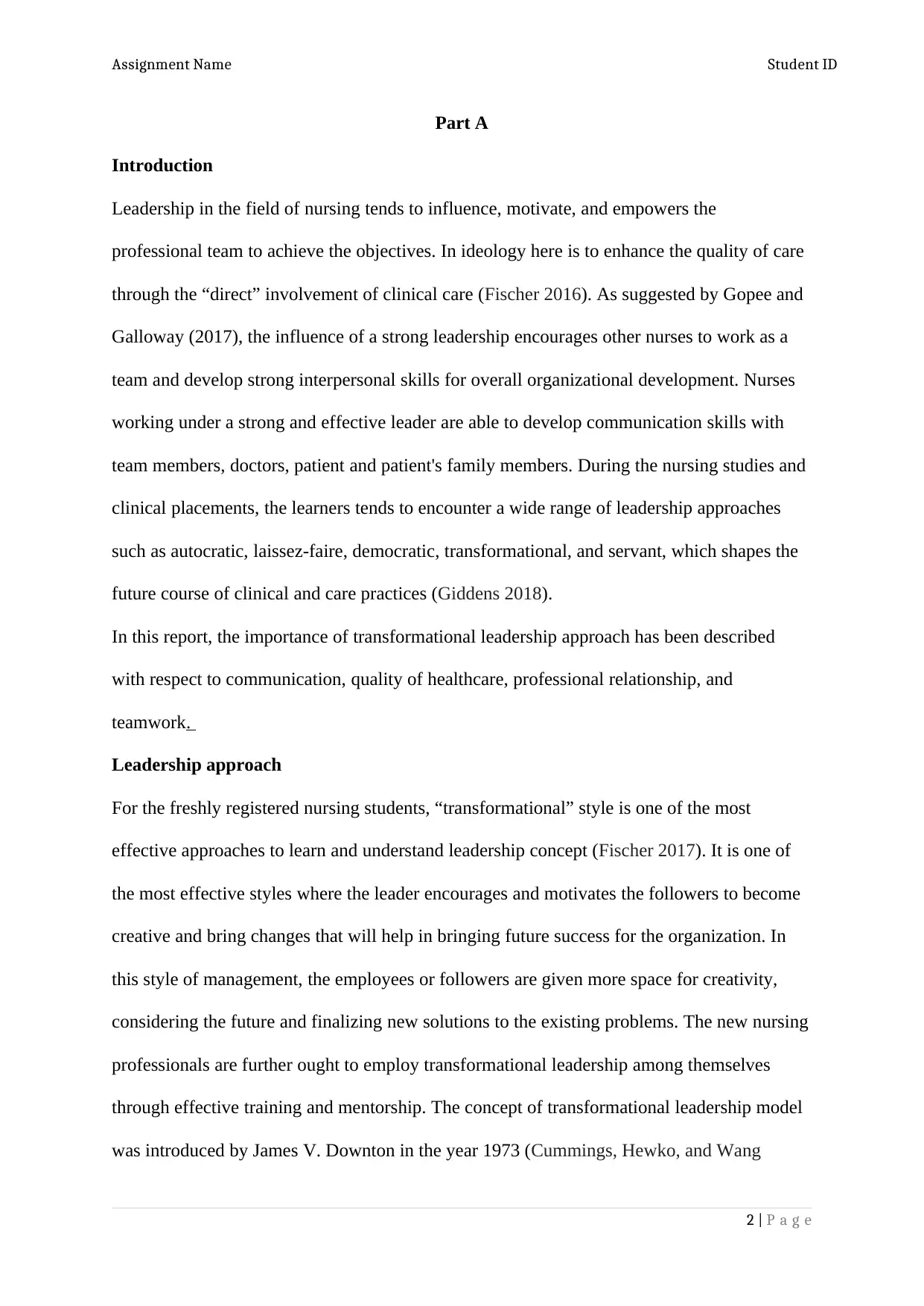
Assignment Name Student ID
Part A
Introduction
Leadership in the field of nursing tends to influence, motivate, and empowers the
professional team to achieve the objectives. In ideology here is to enhance the quality of care
through the “direct” involvement of clinical care (Fischer 2016). As suggested by Gopee and
Galloway (2017), the influence of a strong leadership encourages other nurses to work as a
team and develop strong interpersonal skills for overall organizational development. Nurses
working under a strong and effective leader are able to develop communication skills with
team members, doctors, patient and patient's family members. During the nursing studies and
clinical placements, the learners tends to encounter a wide range of leadership approaches
such as autocratic, laissez-faire, democratic, transformational, and servant, which shapes the
future course of clinical and care practices (Giddens 2018).
In this report, the importance of transformational leadership approach has been described
with respect to communication, quality of healthcare, professional relationship, and
teamwork.
Leadership approach
For the freshly registered nursing students, “transformational” style is one of the most
effective approaches to learn and understand leadership concept (Fischer 2017). It is one of
the most effective styles where the leader encourages and motivates the followers to become
creative and bring changes that will help in bringing future success for the organization. In
this style of management, the employees or followers are given more space for creativity,
considering the future and finalizing new solutions to the existing problems. The new nursing
professionals are further ought to employ transformational leadership among themselves
through effective training and mentorship. The concept of transformational leadership model
was introduced by James V. Downton in the year 1973 (Cummings, Hewko, and Wang
2 | P a g e
Part A
Introduction
Leadership in the field of nursing tends to influence, motivate, and empowers the
professional team to achieve the objectives. In ideology here is to enhance the quality of care
through the “direct” involvement of clinical care (Fischer 2016). As suggested by Gopee and
Galloway (2017), the influence of a strong leadership encourages other nurses to work as a
team and develop strong interpersonal skills for overall organizational development. Nurses
working under a strong and effective leader are able to develop communication skills with
team members, doctors, patient and patient's family members. During the nursing studies and
clinical placements, the learners tends to encounter a wide range of leadership approaches
such as autocratic, laissez-faire, democratic, transformational, and servant, which shapes the
future course of clinical and care practices (Giddens 2018).
In this report, the importance of transformational leadership approach has been described
with respect to communication, quality of healthcare, professional relationship, and
teamwork.
Leadership approach
For the freshly registered nursing students, “transformational” style is one of the most
effective approaches to learn and understand leadership concept (Fischer 2017). It is one of
the most effective styles where the leader encourages and motivates the followers to become
creative and bring changes that will help in bringing future success for the organization. In
this style of management, the employees or followers are given more space for creativity,
considering the future and finalizing new solutions to the existing problems. The new nursing
professionals are further ought to employ transformational leadership among themselves
through effective training and mentorship. The concept of transformational leadership model
was introduced by James V. Downton in the year 1973 (Cummings, Hewko, and Wang
2 | P a g e
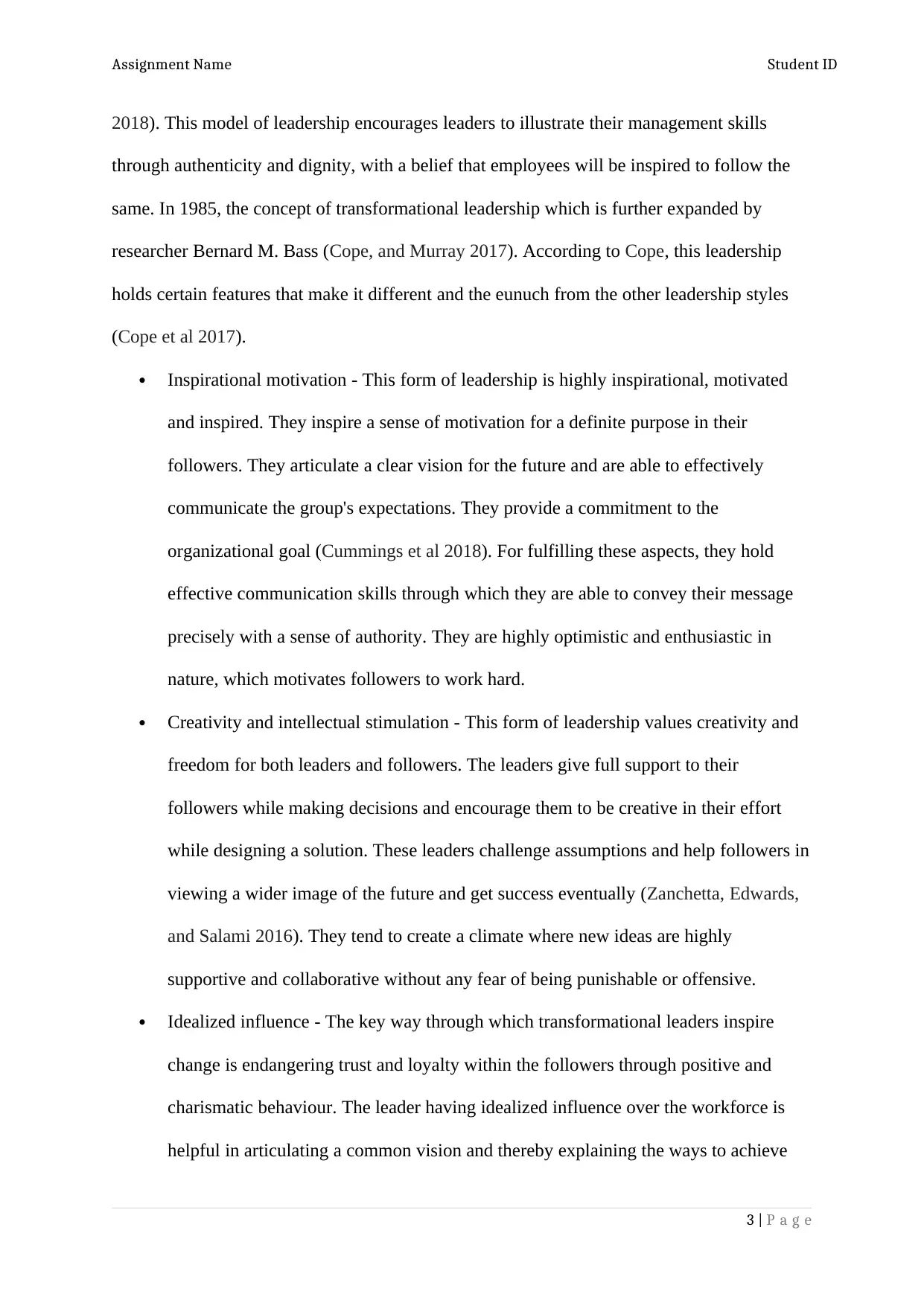
Assignment Name Student ID
2018). This model of leadership encourages leaders to illustrate their management skills
through authenticity and dignity, with a belief that employees will be inspired to follow the
same. In 1985, the concept of transformational leadership which is further expanded by
researcher Bernard M. Bass (Cope, and Murray 2017). According to Cope, this leadership
holds certain features that make it different and the eunuch from the other leadership styles
(Cope et al 2017).
Inspirational motivation - This form of leadership is highly inspirational, motivated
and inspired. They inspire a sense of motivation for a definite purpose in their
followers. They articulate a clear vision for the future and are able to effectively
communicate the group's expectations. They provide a commitment to the
organizational goal (Cummings et al 2018). For fulfilling these aspects, they hold
effective communication skills through which they are able to convey their message
precisely with a sense of authority. They are highly optimistic and enthusiastic in
nature, which motivates followers to work hard.
Creativity and intellectual stimulation - This form of leadership values creativity and
freedom for both leaders and followers. The leaders give full support to their
followers while making decisions and encourage them to be creative in their effort
while designing a solution. These leaders challenge assumptions and help followers in
viewing a wider image of the future and get success eventually (Zanchetta, Edwards,
and Salami 2016). They tend to create a climate where new ideas are highly
supportive and collaborative without any fear of being punishable or offensive.
Idealized influence - The key way through which transformational leaders inspire
change is endangering trust and loyalty within the followers through positive and
charismatic behaviour. The leader having idealized influence over the workforce is
helpful in articulating a common vision and thereby explaining the ways to achieve
3 | P a g e
2018). This model of leadership encourages leaders to illustrate their management skills
through authenticity and dignity, with a belief that employees will be inspired to follow the
same. In 1985, the concept of transformational leadership which is further expanded by
researcher Bernard M. Bass (Cope, and Murray 2017). According to Cope, this leadership
holds certain features that make it different and the eunuch from the other leadership styles
(Cope et al 2017).
Inspirational motivation - This form of leadership is highly inspirational, motivated
and inspired. They inspire a sense of motivation for a definite purpose in their
followers. They articulate a clear vision for the future and are able to effectively
communicate the group's expectations. They provide a commitment to the
organizational goal (Cummings et al 2018). For fulfilling these aspects, they hold
effective communication skills through which they are able to convey their message
precisely with a sense of authority. They are highly optimistic and enthusiastic in
nature, which motivates followers to work hard.
Creativity and intellectual stimulation - This form of leadership values creativity and
freedom for both leaders and followers. The leaders give full support to their
followers while making decisions and encourage them to be creative in their effort
while designing a solution. These leaders challenge assumptions and help followers in
viewing a wider image of the future and get success eventually (Zanchetta, Edwards,
and Salami 2016). They tend to create a climate where new ideas are highly
supportive and collaborative without any fear of being punishable or offensive.
Idealized influence - The key way through which transformational leaders inspire
change is endangering trust and loyalty within the followers through positive and
charismatic behaviour. The leader having idealized influence over the workforce is
helpful in articulating a common vision and thereby explaining the ways to achieve
3 | P a g e
⊘ This is a preview!⊘
Do you want full access?
Subscribe today to unlock all pages.

Trusted by 1+ million students worldwide
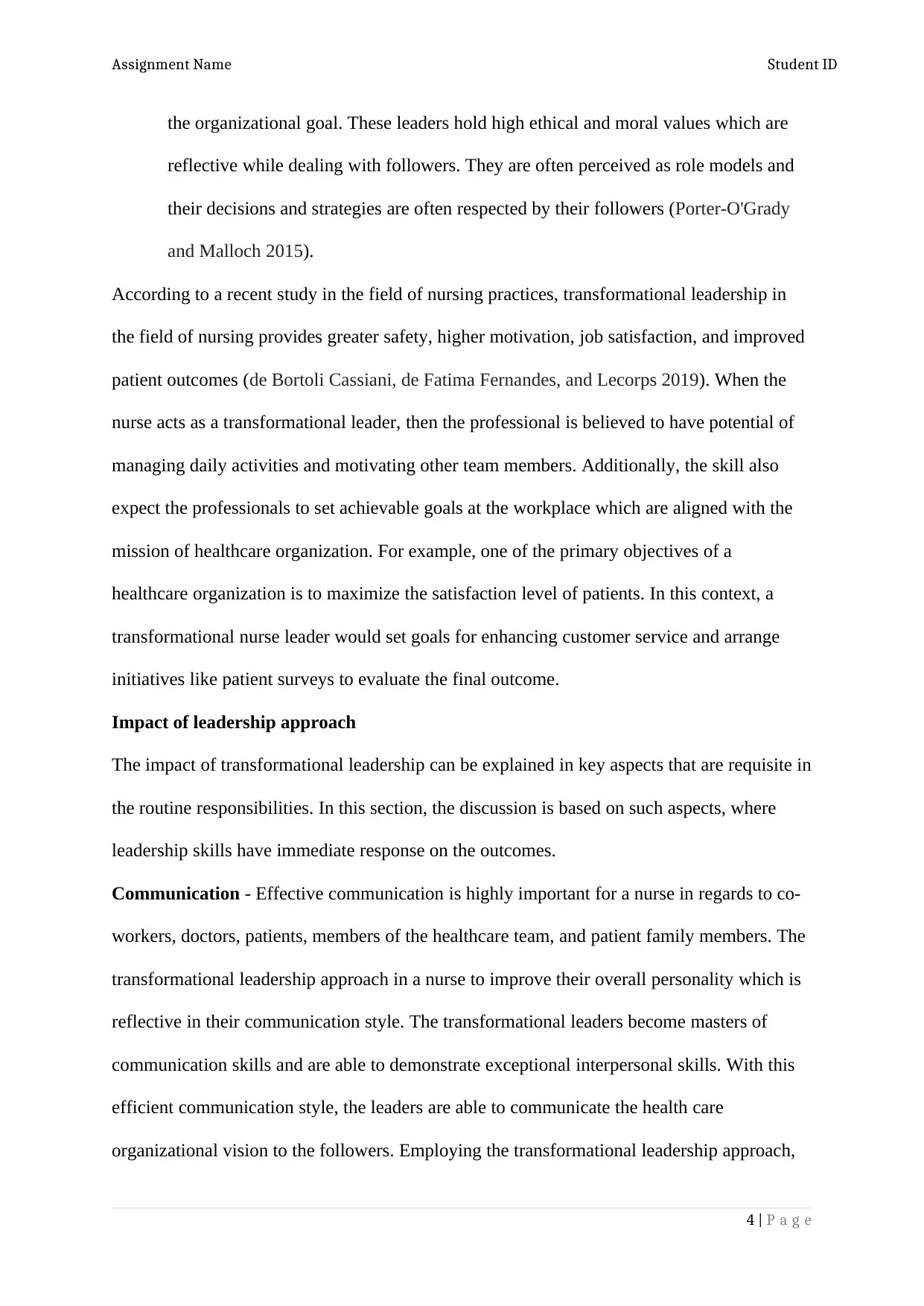
Assignment Name Student ID
the organizational goal. These leaders hold high ethical and moral values which are
reflective while dealing with followers. They are often perceived as role models and
their decisions and strategies are often respected by their followers (Porter-O'Grady
and Malloch 2015).
According to a recent study in the field of nursing practices, transformational leadership in
the field of nursing provides greater safety, higher motivation, job satisfaction, and improved
patient outcomes (de Bortoli Cassiani, de Fatima Fernandes, and Lecorps 2019). When the
nurse acts as a transformational leader, then the professional is believed to have potential of
managing daily activities and motivating other team members. Additionally, the skill also
expect the professionals to set achievable goals at the workplace which are aligned with the
mission of healthcare organization. For example, one of the primary objectives of a
healthcare organization is to maximize the satisfaction level of patients. In this context, a
transformational nurse leader would set goals for enhancing customer service and arrange
initiatives like patient surveys to evaluate the final outcome.
Impact of leadership approach
The impact of transformational leadership can be explained in key aspects that are requisite in
the routine responsibilities. In this section, the discussion is based on such aspects, where
leadership skills have immediate response on the outcomes.
Communication - Effective communication is highly important for a nurse in regards to co-
workers, doctors, patients, members of the healthcare team, and patient family members. The
transformational leadership approach in a nurse to improve their overall personality which is
reflective in their communication style. The transformational leaders become masters of
communication skills and are able to demonstrate exceptional interpersonal skills. With this
efficient communication style, the leaders are able to communicate the health care
organizational vision to the followers. Employing the transformational leadership approach,
4 | P a g e
the organizational goal. These leaders hold high ethical and moral values which are
reflective while dealing with followers. They are often perceived as role models and
their decisions and strategies are often respected by their followers (Porter-O'Grady
and Malloch 2015).
According to a recent study in the field of nursing practices, transformational leadership in
the field of nursing provides greater safety, higher motivation, job satisfaction, and improved
patient outcomes (de Bortoli Cassiani, de Fatima Fernandes, and Lecorps 2019). When the
nurse acts as a transformational leader, then the professional is believed to have potential of
managing daily activities and motivating other team members. Additionally, the skill also
expect the professionals to set achievable goals at the workplace which are aligned with the
mission of healthcare organization. For example, one of the primary objectives of a
healthcare organization is to maximize the satisfaction level of patients. In this context, a
transformational nurse leader would set goals for enhancing customer service and arrange
initiatives like patient surveys to evaluate the final outcome.
Impact of leadership approach
The impact of transformational leadership can be explained in key aspects that are requisite in
the routine responsibilities. In this section, the discussion is based on such aspects, where
leadership skills have immediate response on the outcomes.
Communication - Effective communication is highly important for a nurse in regards to co-
workers, doctors, patients, members of the healthcare team, and patient family members. The
transformational leadership approach in a nurse to improve their overall personality which is
reflective in their communication style. The transformational leaders become masters of
communication skills and are able to demonstrate exceptional interpersonal skills. With this
efficient communication style, the leaders are able to communicate the health care
organizational vision to the followers. Employing the transformational leadership approach,
4 | P a g e
Paraphrase This Document
Need a fresh take? Get an instant paraphrase of this document with our AI Paraphraser
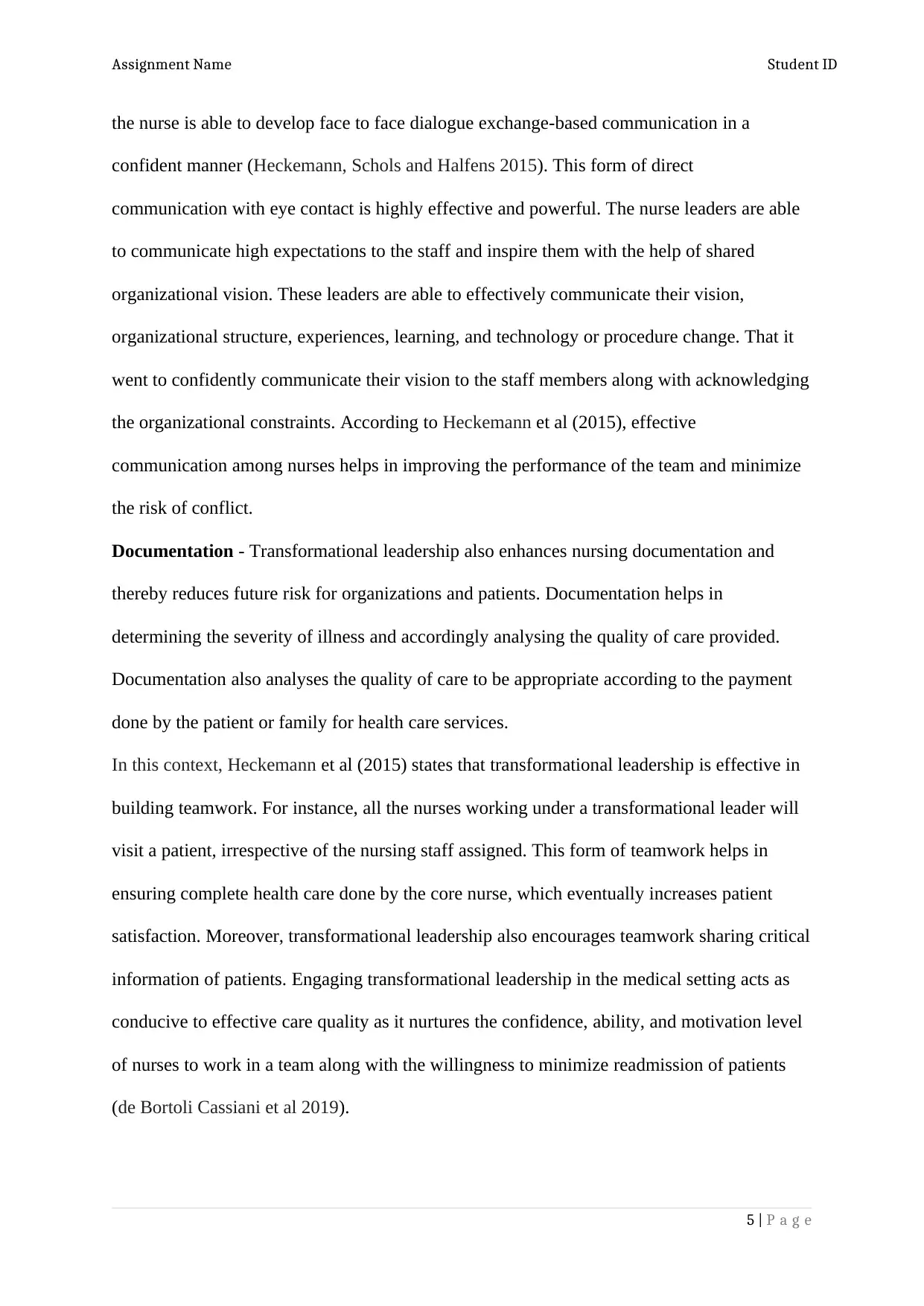
Assignment Name Student ID
the nurse is able to develop face to face dialogue exchange-based communication in a
confident manner (Heckemann, Schols and Halfens 2015). This form of direct
communication with eye contact is highly effective and powerful. The nurse leaders are able
to communicate high expectations to the staff and inspire them with the help of shared
organizational vision. These leaders are able to effectively communicate their vision,
organizational structure, experiences, learning, and technology or procedure change. That it
went to confidently communicate their vision to the staff members along with acknowledging
the organizational constraints. According to Heckemann et al (2015), effective
communication among nurses helps in improving the performance of the team and minimize
the risk of conflict.
Documentation - Transformational leadership also enhances nursing documentation and
thereby reduces future risk for organizations and patients. Documentation helps in
determining the severity of illness and accordingly analysing the quality of care provided.
Documentation also analyses the quality of care to be appropriate according to the payment
done by the patient or family for health care services.
In this context, Heckemann et al (2015) states that transformational leadership is effective in
building teamwork. For instance, all the nurses working under a transformational leader will
visit a patient, irrespective of the nursing staff assigned. This form of teamwork helps in
ensuring complete health care done by the core nurse, which eventually increases patient
satisfaction. Moreover, transformational leadership also encourages teamwork sharing critical
information of patients. Engaging transformational leadership in the medical setting acts as
conducive to effective care quality as it nurtures the confidence, ability, and motivation level
of nurses to work in a team along with the willingness to minimize readmission of patients
(de Bortoli Cassiani et al 2019).
5 | P a g e
the nurse is able to develop face to face dialogue exchange-based communication in a
confident manner (Heckemann, Schols and Halfens 2015). This form of direct
communication with eye contact is highly effective and powerful. The nurse leaders are able
to communicate high expectations to the staff and inspire them with the help of shared
organizational vision. These leaders are able to effectively communicate their vision,
organizational structure, experiences, learning, and technology or procedure change. That it
went to confidently communicate their vision to the staff members along with acknowledging
the organizational constraints. According to Heckemann et al (2015), effective
communication among nurses helps in improving the performance of the team and minimize
the risk of conflict.
Documentation - Transformational leadership also enhances nursing documentation and
thereby reduces future risk for organizations and patients. Documentation helps in
determining the severity of illness and accordingly analysing the quality of care provided.
Documentation also analyses the quality of care to be appropriate according to the payment
done by the patient or family for health care services.
In this context, Heckemann et al (2015) states that transformational leadership is effective in
building teamwork. For instance, all the nurses working under a transformational leader will
visit a patient, irrespective of the nursing staff assigned. This form of teamwork helps in
ensuring complete health care done by the core nurse, which eventually increases patient
satisfaction. Moreover, transformational leadership also encourages teamwork sharing critical
information of patients. Engaging transformational leadership in the medical setting acts as
conducive to effective care quality as it nurtures the confidence, ability, and motivation level
of nurses to work in a team along with the willingness to minimize readmission of patients
(de Bortoli Cassiani et al 2019).
5 | P a g e
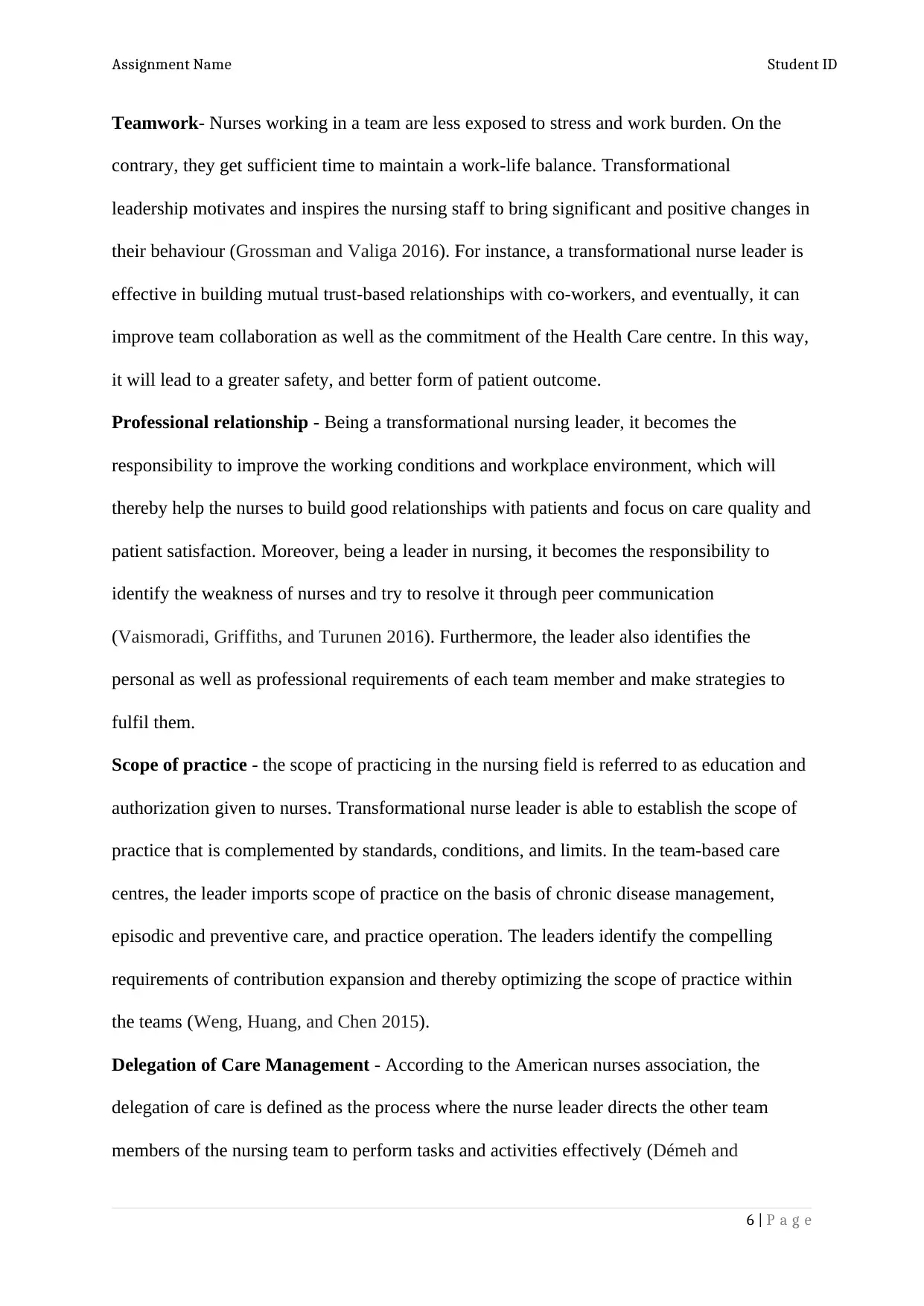
Assignment Name Student ID
Teamwork- Nurses working in a team are less exposed to stress and work burden. On the
contrary, they get sufficient time to maintain a work-life balance. Transformational
leadership motivates and inspires the nursing staff to bring significant and positive changes in
their behaviour (Grossman and Valiga 2016). For instance, a transformational nurse leader is
effective in building mutual trust-based relationships with co-workers, and eventually, it can
improve team collaboration as well as the commitment of the Health Care centre. In this way,
it will lead to a greater safety, and better form of patient outcome.
Professional relationship - Being a transformational nursing leader, it becomes the
responsibility to improve the working conditions and workplace environment, which will
thereby help the nurses to build good relationships with patients and focus on care quality and
patient satisfaction. Moreover, being a leader in nursing, it becomes the responsibility to
identify the weakness of nurses and try to resolve it through peer communication
(Vaismoradi, Griffiths, and Turunen 2016). Furthermore, the leader also identifies the
personal as well as professional requirements of each team member and make strategies to
fulfil them.
Scope of practice - the scope of practicing in the nursing field is referred to as education and
authorization given to nurses. Transformational nurse leader is able to establish the scope of
practice that is complemented by standards, conditions, and limits. In the team-based care
centres, the leader imports scope of practice on the basis of chronic disease management,
episodic and preventive care, and practice operation. The leaders identify the compelling
requirements of contribution expansion and thereby optimizing the scope of practice within
the teams (Weng, Huang, and Chen 2015).
Delegation of Care Management - According to the American nurses association, the
delegation of care is defined as the process where the nurse leader directs the other team
members of the nursing team to perform tasks and activities effectively (Démeh and
6 | P a g e
Teamwork- Nurses working in a team are less exposed to stress and work burden. On the
contrary, they get sufficient time to maintain a work-life balance. Transformational
leadership motivates and inspires the nursing staff to bring significant and positive changes in
their behaviour (Grossman and Valiga 2016). For instance, a transformational nurse leader is
effective in building mutual trust-based relationships with co-workers, and eventually, it can
improve team collaboration as well as the commitment of the Health Care centre. In this way,
it will lead to a greater safety, and better form of patient outcome.
Professional relationship - Being a transformational nursing leader, it becomes the
responsibility to improve the working conditions and workplace environment, which will
thereby help the nurses to build good relationships with patients and focus on care quality and
patient satisfaction. Moreover, being a leader in nursing, it becomes the responsibility to
identify the weakness of nurses and try to resolve it through peer communication
(Vaismoradi, Griffiths, and Turunen 2016). Furthermore, the leader also identifies the
personal as well as professional requirements of each team member and make strategies to
fulfil them.
Scope of practice - the scope of practicing in the nursing field is referred to as education and
authorization given to nurses. Transformational nurse leader is able to establish the scope of
practice that is complemented by standards, conditions, and limits. In the team-based care
centres, the leader imports scope of practice on the basis of chronic disease management,
episodic and preventive care, and practice operation. The leaders identify the compelling
requirements of contribution expansion and thereby optimizing the scope of practice within
the teams (Weng, Huang, and Chen 2015).
Delegation of Care Management - According to the American nurses association, the
delegation of care is defined as the process where the nurse leader directs the other team
members of the nursing team to perform tasks and activities effectively (Démeh and
6 | P a g e
⊘ This is a preview!⊘
Do you want full access?
Subscribe today to unlock all pages.

Trusted by 1+ million students worldwide
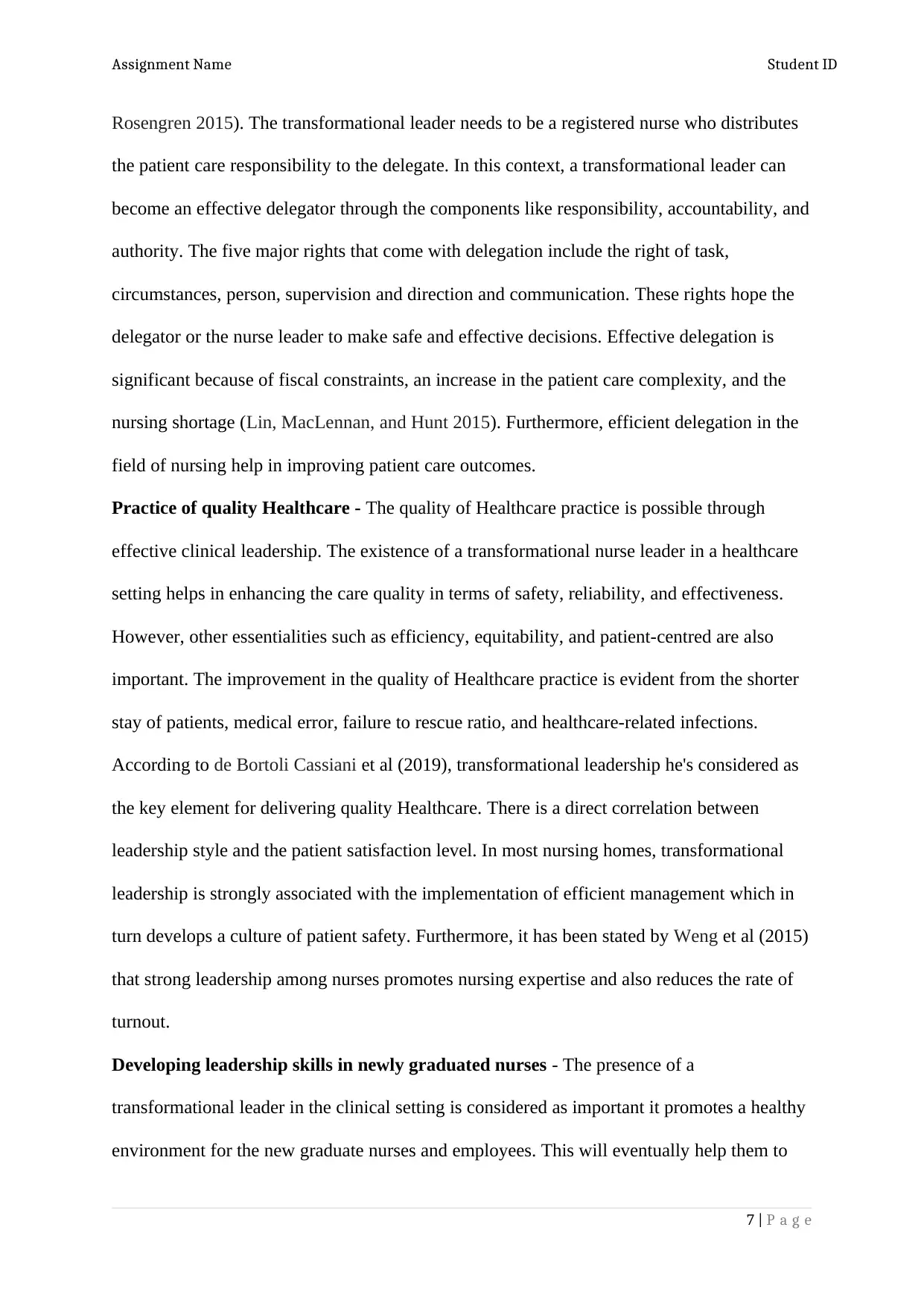
Assignment Name Student ID
Rosengren 2015). The transformational leader needs to be a registered nurse who distributes
the patient care responsibility to the delegate. In this context, a transformational leader can
become an effective delegator through the components like responsibility, accountability, and
authority. The five major rights that come with delegation include the right of task,
circumstances, person, supervision and direction and communication. These rights hope the
delegator or the nurse leader to make safe and effective decisions. Effective delegation is
significant because of fiscal constraints, an increase in the patient care complexity, and the
nursing shortage (Lin, MacLennan, and Hunt 2015). Furthermore, efficient delegation in the
field of nursing help in improving patient care outcomes.
Practice of quality Healthcare - The quality of Healthcare practice is possible through
effective clinical leadership. The existence of a transformational nurse leader in a healthcare
setting helps in enhancing the care quality in terms of safety, reliability, and effectiveness.
However, other essentialities such as efficiency, equitability, and patient-centred are also
important. The improvement in the quality of Healthcare practice is evident from the shorter
stay of patients, medical error, failure to rescue ratio, and healthcare-related infections.
According to de Bortoli Cassiani et al (2019), transformational leadership he's considered as
the key element for delivering quality Healthcare. There is a direct correlation between
leadership style and the patient satisfaction level. In most nursing homes, transformational
leadership is strongly associated with the implementation of efficient management which in
turn develops a culture of patient safety. Furthermore, it has been stated by Weng et al (2015)
that strong leadership among nurses promotes nursing expertise and also reduces the rate of
turnout.
Developing leadership skills in newly graduated nurses - The presence of a
transformational leader in the clinical setting is considered as important it promotes a healthy
environment for the new graduate nurses and employees. This will eventually help them to
7 | P a g e
Rosengren 2015). The transformational leader needs to be a registered nurse who distributes
the patient care responsibility to the delegate. In this context, a transformational leader can
become an effective delegator through the components like responsibility, accountability, and
authority. The five major rights that come with delegation include the right of task,
circumstances, person, supervision and direction and communication. These rights hope the
delegator or the nurse leader to make safe and effective decisions. Effective delegation is
significant because of fiscal constraints, an increase in the patient care complexity, and the
nursing shortage (Lin, MacLennan, and Hunt 2015). Furthermore, efficient delegation in the
field of nursing help in improving patient care outcomes.
Practice of quality Healthcare - The quality of Healthcare practice is possible through
effective clinical leadership. The existence of a transformational nurse leader in a healthcare
setting helps in enhancing the care quality in terms of safety, reliability, and effectiveness.
However, other essentialities such as efficiency, equitability, and patient-centred are also
important. The improvement in the quality of Healthcare practice is evident from the shorter
stay of patients, medical error, failure to rescue ratio, and healthcare-related infections.
According to de Bortoli Cassiani et al (2019), transformational leadership he's considered as
the key element for delivering quality Healthcare. There is a direct correlation between
leadership style and the patient satisfaction level. In most nursing homes, transformational
leadership is strongly associated with the implementation of efficient management which in
turn develops a culture of patient safety. Furthermore, it has been stated by Weng et al (2015)
that strong leadership among nurses promotes nursing expertise and also reduces the rate of
turnout.
Developing leadership skills in newly graduated nurses - The presence of a
transformational leader in the clinical setting is considered as important it promotes a healthy
environment for the new graduate nurses and employees. This will eventually help them to
7 | P a g e
Paraphrase This Document
Need a fresh take? Get an instant paraphrase of this document with our AI Paraphraser
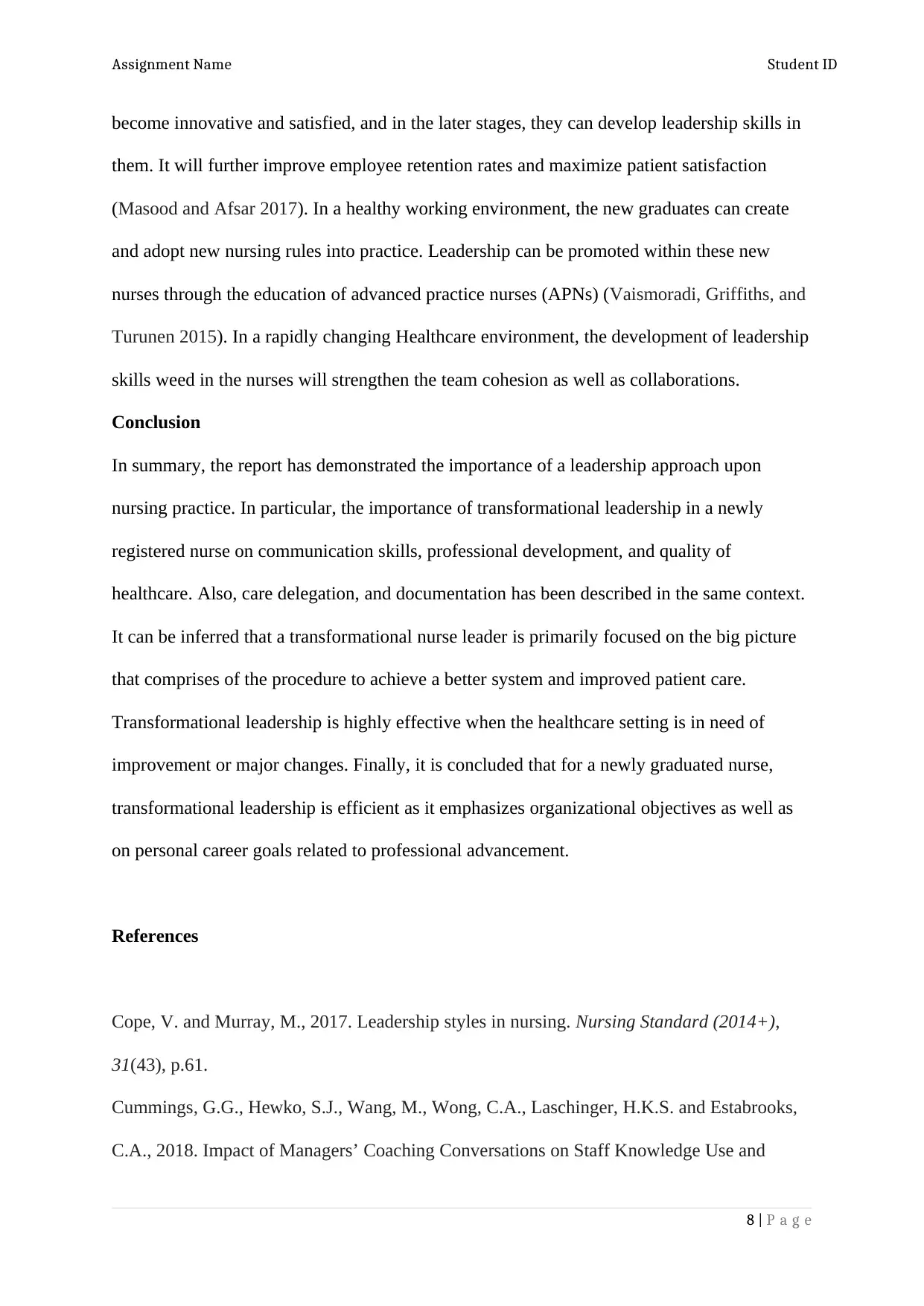
Assignment Name Student ID
become innovative and satisfied, and in the later stages, they can develop leadership skills in
them. It will further improve employee retention rates and maximize patient satisfaction
(Masood and Afsar 2017). In a healthy working environment, the new graduates can create
and adopt new nursing rules into practice. Leadership can be promoted within these new
nurses through the education of advanced practice nurses (APNs) (Vaismoradi, Griffiths, and
Turunen 2015). In a rapidly changing Healthcare environment, the development of leadership
skills weed in the nurses will strengthen the team cohesion as well as collaborations.
Conclusion
In summary, the report has demonstrated the importance of a leadership approach upon
nursing practice. In particular, the importance of transformational leadership in a newly
registered nurse on communication skills, professional development, and quality of
healthcare. Also, care delegation, and documentation has been described in the same context.
It can be inferred that a transformational nurse leader is primarily focused on the big picture
that comprises of the procedure to achieve a better system and improved patient care.
Transformational leadership is highly effective when the healthcare setting is in need of
improvement or major changes. Finally, it is concluded that for a newly graduated nurse,
transformational leadership is efficient as it emphasizes organizational objectives as well as
on personal career goals related to professional advancement.
References
Cope, V. and Murray, M., 2017. Leadership styles in nursing. Nursing Standard (2014+),
31(43), p.61.
Cummings, G.G., Hewko, S.J., Wang, M., Wong, C.A., Laschinger, H.K.S. and Estabrooks,
C.A., 2018. Impact of Managers’ Coaching Conversations on Staff Knowledge Use and
8 | P a g e
become innovative and satisfied, and in the later stages, they can develop leadership skills in
them. It will further improve employee retention rates and maximize patient satisfaction
(Masood and Afsar 2017). In a healthy working environment, the new graduates can create
and adopt new nursing rules into practice. Leadership can be promoted within these new
nurses through the education of advanced practice nurses (APNs) (Vaismoradi, Griffiths, and
Turunen 2015). In a rapidly changing Healthcare environment, the development of leadership
skills weed in the nurses will strengthen the team cohesion as well as collaborations.
Conclusion
In summary, the report has demonstrated the importance of a leadership approach upon
nursing practice. In particular, the importance of transformational leadership in a newly
registered nurse on communication skills, professional development, and quality of
healthcare. Also, care delegation, and documentation has been described in the same context.
It can be inferred that a transformational nurse leader is primarily focused on the big picture
that comprises of the procedure to achieve a better system and improved patient care.
Transformational leadership is highly effective when the healthcare setting is in need of
improvement or major changes. Finally, it is concluded that for a newly graduated nurse,
transformational leadership is efficient as it emphasizes organizational objectives as well as
on personal career goals related to professional advancement.
References
Cope, V. and Murray, M., 2017. Leadership styles in nursing. Nursing Standard (2014+),
31(43), p.61.
Cummings, G.G., Hewko, S.J., Wang, M., Wong, C.A., Laschinger, H.K.S. and Estabrooks,
C.A., 2018. Impact of Managers’ Coaching Conversations on Staff Knowledge Use and
8 | P a g e
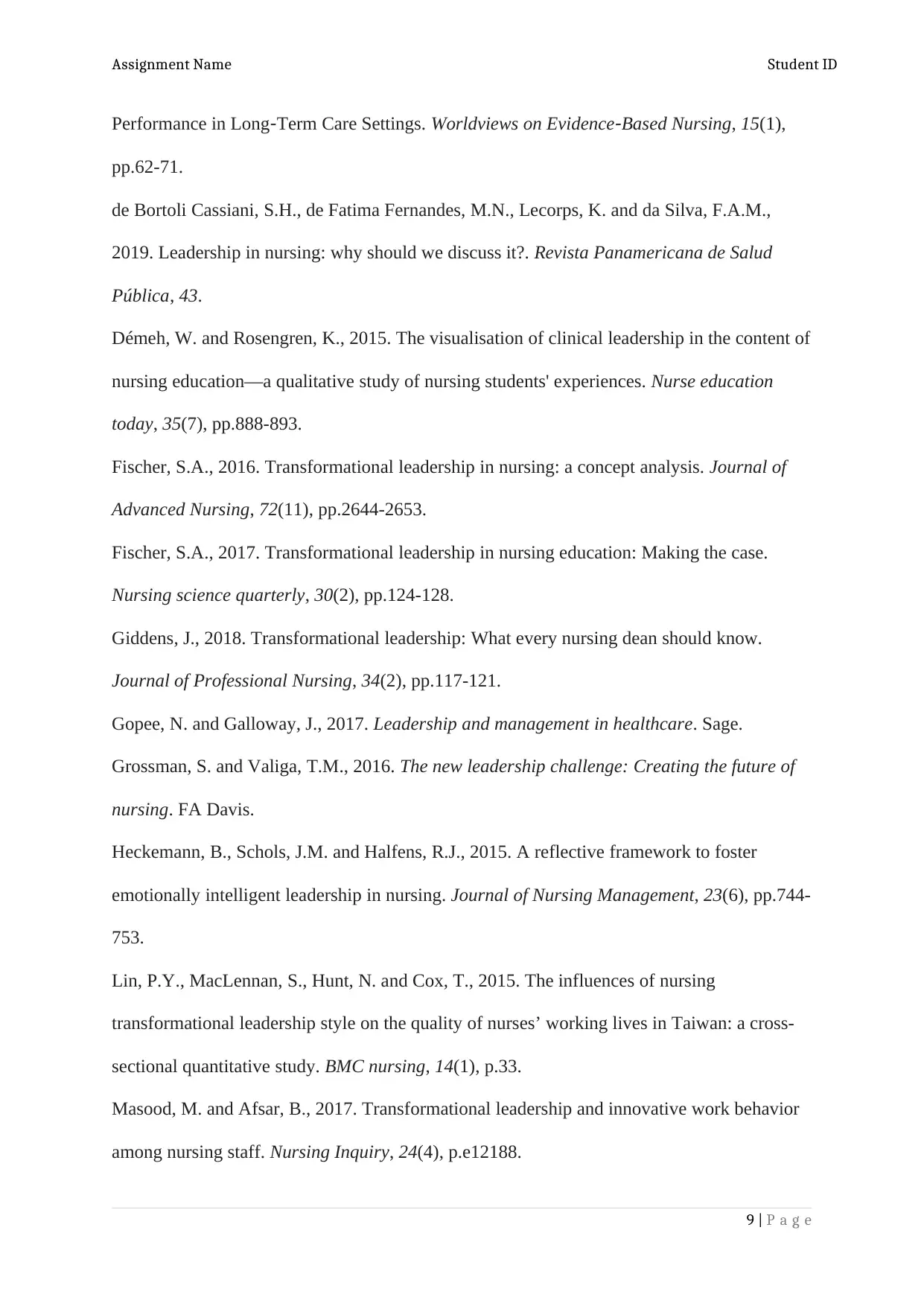
Assignment Name Student ID
Performance in Long‐Term Care Settings. Worldviews on Evidence‐Based Nursing, 15(1),
pp.62-71.
de Bortoli Cassiani, S.H., de Fatima Fernandes, M.N., Lecorps, K. and da Silva, F.A.M.,
2019. Leadership in nursing: why should we discuss it?. Revista Panamericana de Salud
Pública, 43.
Démeh, W. and Rosengren, K., 2015. The visualisation of clinical leadership in the content of
nursing education—a qualitative study of nursing students' experiences. Nurse education
today, 35(7), pp.888-893.
Fischer, S.A., 2016. Transformational leadership in nursing: a concept analysis. Journal of
Advanced Nursing, 72(11), pp.2644-2653.
Fischer, S.A., 2017. Transformational leadership in nursing education: Making the case.
Nursing science quarterly, 30(2), pp.124-128.
Giddens, J., 2018. Transformational leadership: What every nursing dean should know.
Journal of Professional Nursing, 34(2), pp.117-121.
Gopee, N. and Galloway, J., 2017. Leadership and management in healthcare. Sage.
Grossman, S. and Valiga, T.M., 2016. The new leadership challenge: Creating the future of
nursing. FA Davis.
Heckemann, B., Schols, J.M. and Halfens, R.J., 2015. A reflective framework to foster
emotionally intelligent leadership in nursing. Journal of Nursing Management, 23(6), pp.744-
753.
Lin, P.Y., MacLennan, S., Hunt, N. and Cox, T., 2015. The influences of nursing
transformational leadership style on the quality of nurses’ working lives in Taiwan: a cross-
sectional quantitative study. BMC nursing, 14(1), p.33.
Masood, M. and Afsar, B., 2017. Transformational leadership and innovative work behavior
among nursing staff. Nursing Inquiry, 24(4), p.e12188.
9 | P a g e
Performance in Long‐Term Care Settings. Worldviews on Evidence‐Based Nursing, 15(1),
pp.62-71.
de Bortoli Cassiani, S.H., de Fatima Fernandes, M.N., Lecorps, K. and da Silva, F.A.M.,
2019. Leadership in nursing: why should we discuss it?. Revista Panamericana de Salud
Pública, 43.
Démeh, W. and Rosengren, K., 2015. The visualisation of clinical leadership in the content of
nursing education—a qualitative study of nursing students' experiences. Nurse education
today, 35(7), pp.888-893.
Fischer, S.A., 2016. Transformational leadership in nursing: a concept analysis. Journal of
Advanced Nursing, 72(11), pp.2644-2653.
Fischer, S.A., 2017. Transformational leadership in nursing education: Making the case.
Nursing science quarterly, 30(2), pp.124-128.
Giddens, J., 2018. Transformational leadership: What every nursing dean should know.
Journal of Professional Nursing, 34(2), pp.117-121.
Gopee, N. and Galloway, J., 2017. Leadership and management in healthcare. Sage.
Grossman, S. and Valiga, T.M., 2016. The new leadership challenge: Creating the future of
nursing. FA Davis.
Heckemann, B., Schols, J.M. and Halfens, R.J., 2015. A reflective framework to foster
emotionally intelligent leadership in nursing. Journal of Nursing Management, 23(6), pp.744-
753.
Lin, P.Y., MacLennan, S., Hunt, N. and Cox, T., 2015. The influences of nursing
transformational leadership style on the quality of nurses’ working lives in Taiwan: a cross-
sectional quantitative study. BMC nursing, 14(1), p.33.
Masood, M. and Afsar, B., 2017. Transformational leadership and innovative work behavior
among nursing staff. Nursing Inquiry, 24(4), p.e12188.
9 | P a g e
⊘ This is a preview!⊘
Do you want full access?
Subscribe today to unlock all pages.

Trusted by 1+ million students worldwide
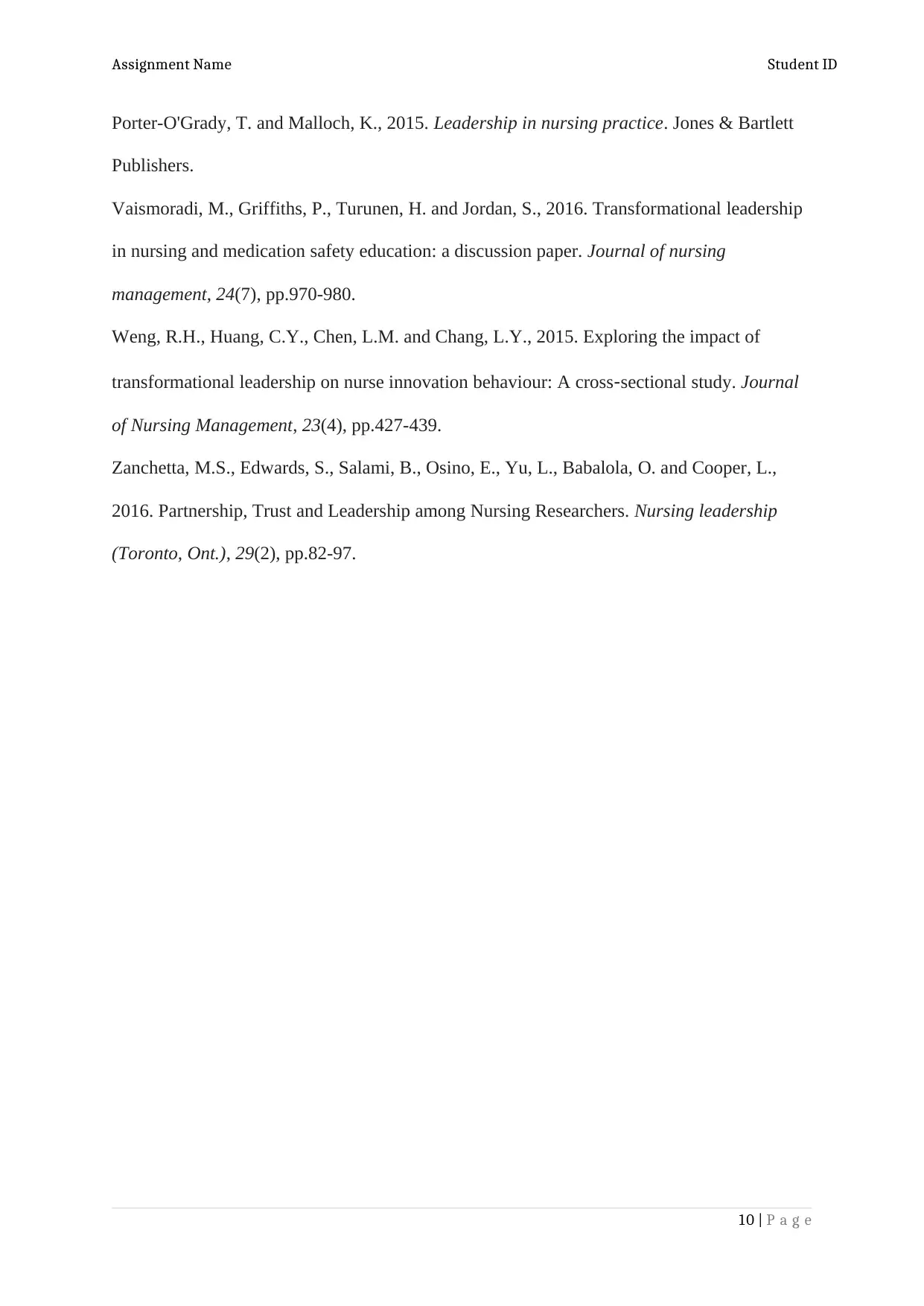
Assignment Name Student ID
Porter-O'Grady, T. and Malloch, K., 2015. Leadership in nursing practice. Jones & Bartlett
Publishers.
Vaismoradi, M., Griffiths, P., Turunen, H. and Jordan, S., 2016. Transformational leadership
in nursing and medication safety education: a discussion paper. Journal of nursing
management, 24(7), pp.970-980.
Weng, R.H., Huang, C.Y., Chen, L.M. and Chang, L.Y., 2015. Exploring the impact of
transformational leadership on nurse innovation behaviour: A cross‐sectional study. Journal
of Nursing Management, 23(4), pp.427-439.
Zanchetta, M.S., Edwards, S., Salami, B., Osino, E., Yu, L., Babalola, O. and Cooper, L.,
2016. Partnership, Trust and Leadership among Nursing Researchers. Nursing leadership
(Toronto, Ont.), 29(2), pp.82-97.
10 | P a g e
Porter-O'Grady, T. and Malloch, K., 2015. Leadership in nursing practice. Jones & Bartlett
Publishers.
Vaismoradi, M., Griffiths, P., Turunen, H. and Jordan, S., 2016. Transformational leadership
in nursing and medication safety education: a discussion paper. Journal of nursing
management, 24(7), pp.970-980.
Weng, R.H., Huang, C.Y., Chen, L.M. and Chang, L.Y., 2015. Exploring the impact of
transformational leadership on nurse innovation behaviour: A cross‐sectional study. Journal
of Nursing Management, 23(4), pp.427-439.
Zanchetta, M.S., Edwards, S., Salami, B., Osino, E., Yu, L., Babalola, O. and Cooper, L.,
2016. Partnership, Trust and Leadership among Nursing Researchers. Nursing leadership
(Toronto, Ont.), 29(2), pp.82-97.
10 | P a g e
Paraphrase This Document
Need a fresh take? Get an instant paraphrase of this document with our AI Paraphraser
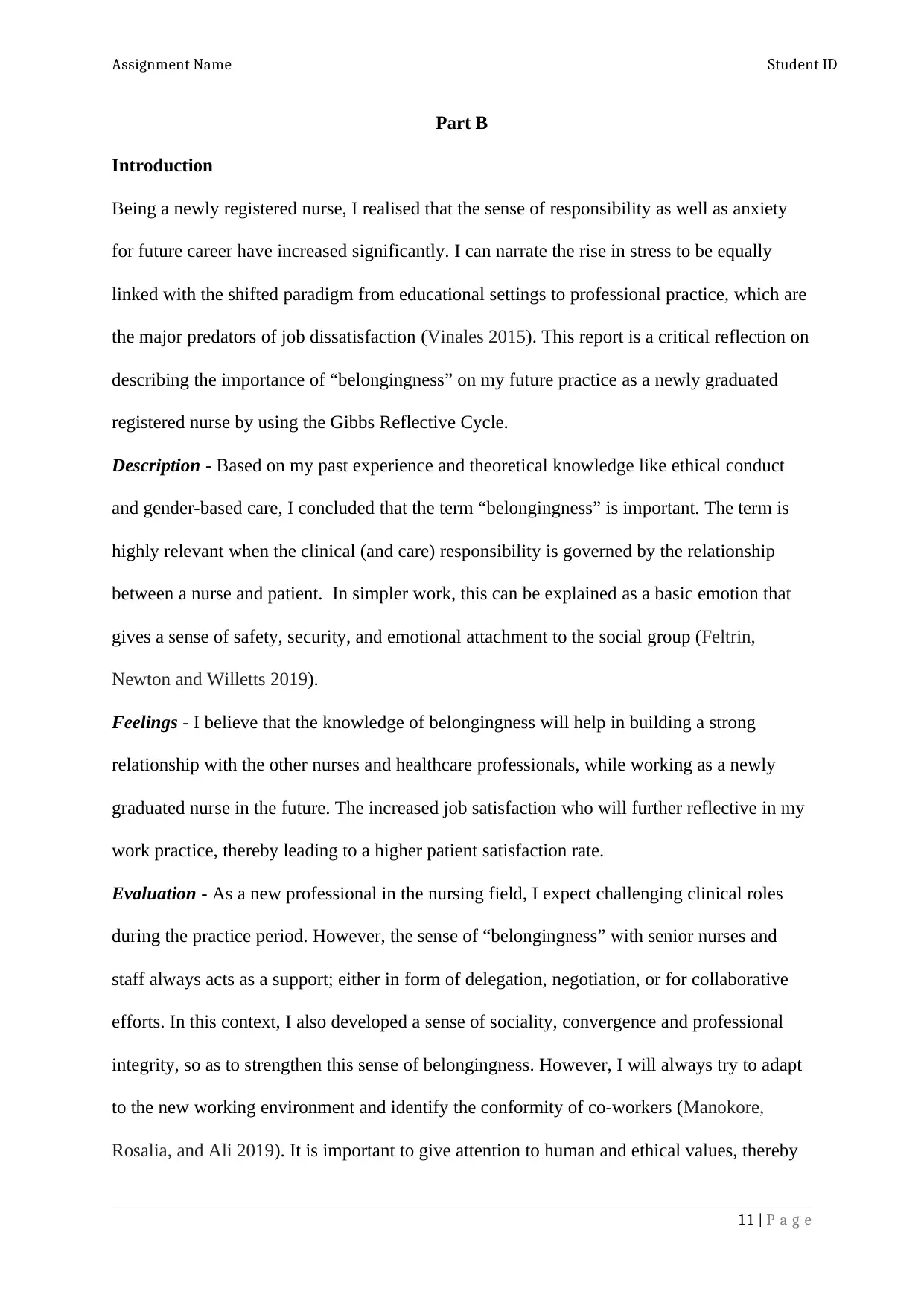
Assignment Name Student ID
Part B
Introduction
Being a newly registered nurse, I realised that the sense of responsibility as well as anxiety
for future career have increased significantly. I can narrate the rise in stress to be equally
linked with the shifted paradigm from educational settings to professional practice, which are
the major predators of job dissatisfaction (Vinales 2015). This report is a critical reflection on
describing the importance of “belongingness” on my future practice as a newly graduated
registered nurse by using the Gibbs Reflective Cycle.
Description - Based on my past experience and theoretical knowledge like ethical conduct
and gender-based care, I concluded that the term “belongingness” is important. The term is
highly relevant when the clinical (and care) responsibility is governed by the relationship
between a nurse and patient. In simpler work, this can be explained as a basic emotion that
gives a sense of safety, security, and emotional attachment to the social group (Feltrin,
Newton and Willetts 2019).
Feelings - I believe that the knowledge of belongingness will help in building a strong
relationship with the other nurses and healthcare professionals, while working as a newly
graduated nurse in the future. The increased job satisfaction who will further reflective in my
work practice, thereby leading to a higher patient satisfaction rate.
Evaluation - As a new professional in the nursing field, I expect challenging clinical roles
during the practice period. However, the sense of “belongingness” with senior nurses and
staff always acts as a support; either in form of delegation, negotiation, or for collaborative
efforts. In this context, I also developed a sense of sociality, convergence and professional
integrity, so as to strengthen this sense of belongingness. However, I will always try to adapt
to the new working environment and identify the conformity of co-workers (Manokore,
Rosalia, and Ali 2019). It is important to give attention to human and ethical values, thereby
11 | P a g e
Part B
Introduction
Being a newly registered nurse, I realised that the sense of responsibility as well as anxiety
for future career have increased significantly. I can narrate the rise in stress to be equally
linked with the shifted paradigm from educational settings to professional practice, which are
the major predators of job dissatisfaction (Vinales 2015). This report is a critical reflection on
describing the importance of “belongingness” on my future practice as a newly graduated
registered nurse by using the Gibbs Reflective Cycle.
Description - Based on my past experience and theoretical knowledge like ethical conduct
and gender-based care, I concluded that the term “belongingness” is important. The term is
highly relevant when the clinical (and care) responsibility is governed by the relationship
between a nurse and patient. In simpler work, this can be explained as a basic emotion that
gives a sense of safety, security, and emotional attachment to the social group (Feltrin,
Newton and Willetts 2019).
Feelings - I believe that the knowledge of belongingness will help in building a strong
relationship with the other nurses and healthcare professionals, while working as a newly
graduated nurse in the future. The increased job satisfaction who will further reflective in my
work practice, thereby leading to a higher patient satisfaction rate.
Evaluation - As a new professional in the nursing field, I expect challenging clinical roles
during the practice period. However, the sense of “belongingness” with senior nurses and
staff always acts as a support; either in form of delegation, negotiation, or for collaborative
efforts. In this context, I also developed a sense of sociality, convergence and professional
integrity, so as to strengthen this sense of belongingness. However, I will always try to adapt
to the new working environment and identify the conformity of co-workers (Manokore,
Rosalia, and Ali 2019). It is important to give attention to human and ethical values, thereby
11 | P a g e
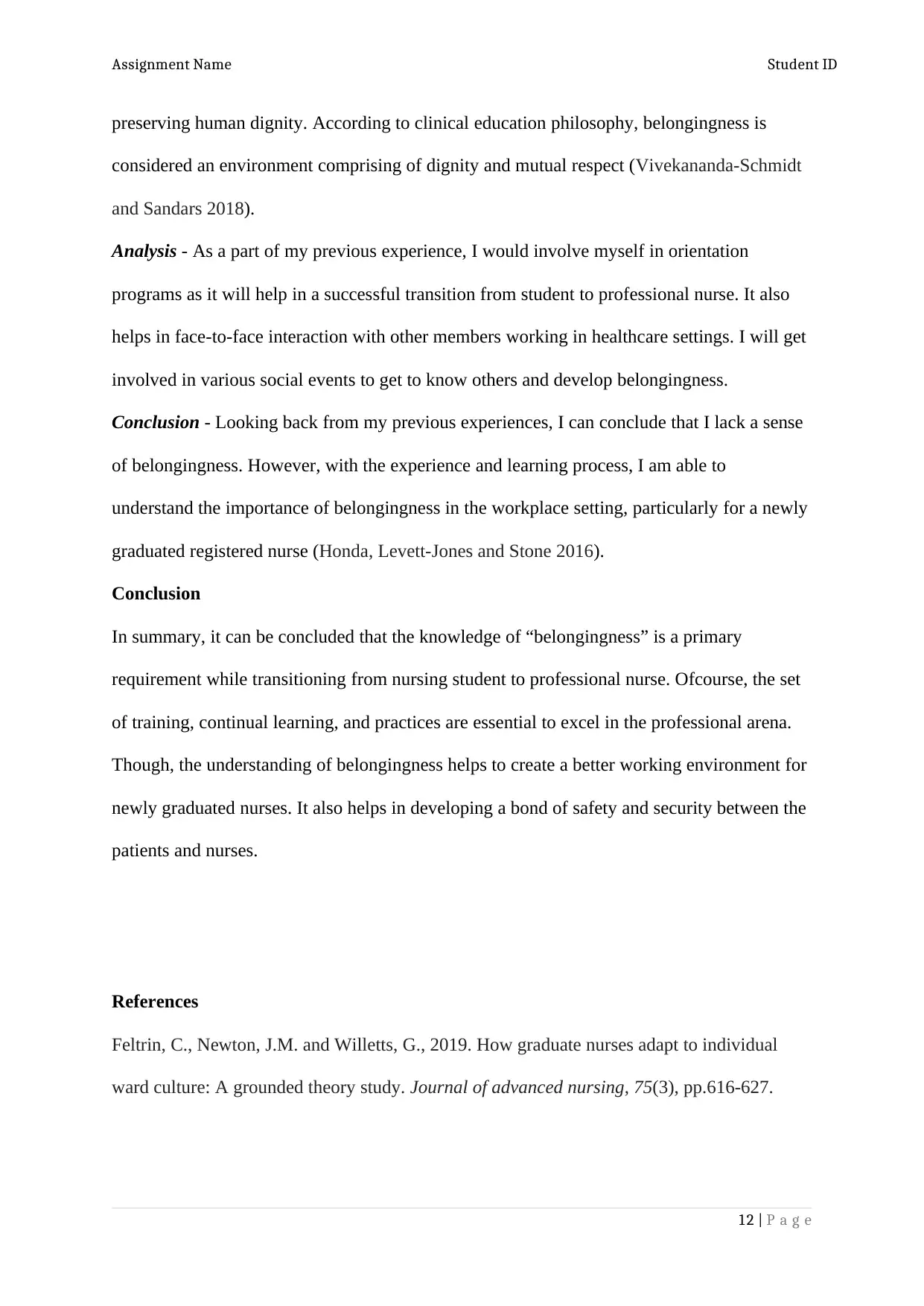
Assignment Name Student ID
preserving human dignity. According to clinical education philosophy, belongingness is
considered an environment comprising of dignity and mutual respect (Vivekananda-Schmidt
and Sandars 2018).
Analysis - As a part of my previous experience, I would involve myself in orientation
programs as it will help in a successful transition from student to professional nurse. It also
helps in face-to-face interaction with other members working in healthcare settings. I will get
involved in various social events to get to know others and develop belongingness.
Conclusion - Looking back from my previous experiences, I can conclude that I lack a sense
of belongingness. However, with the experience and learning process, I am able to
understand the importance of belongingness in the workplace setting, particularly for a newly
graduated registered nurse (Honda, Levett-Jones and Stone 2016).
Conclusion
In summary, it can be concluded that the knowledge of “belongingness” is a primary
requirement while transitioning from nursing student to professional nurse. Ofcourse, the set
of training, continual learning, and practices are essential to excel in the professional arena.
Though, the understanding of belongingness helps to create a better working environment for
newly graduated nurses. It also helps in developing a bond of safety and security between the
patients and nurses.
References
Feltrin, C., Newton, J.M. and Willetts, G., 2019. How graduate nurses adapt to individual
ward culture: A grounded theory study. Journal of advanced nursing, 75(3), pp.616-627.
12 | P a g e
preserving human dignity. According to clinical education philosophy, belongingness is
considered an environment comprising of dignity and mutual respect (Vivekananda-Schmidt
and Sandars 2018).
Analysis - As a part of my previous experience, I would involve myself in orientation
programs as it will help in a successful transition from student to professional nurse. It also
helps in face-to-face interaction with other members working in healthcare settings. I will get
involved in various social events to get to know others and develop belongingness.
Conclusion - Looking back from my previous experiences, I can conclude that I lack a sense
of belongingness. However, with the experience and learning process, I am able to
understand the importance of belongingness in the workplace setting, particularly for a newly
graduated registered nurse (Honda, Levett-Jones and Stone 2016).
Conclusion
In summary, it can be concluded that the knowledge of “belongingness” is a primary
requirement while transitioning from nursing student to professional nurse. Ofcourse, the set
of training, continual learning, and practices are essential to excel in the professional arena.
Though, the understanding of belongingness helps to create a better working environment for
newly graduated nurses. It also helps in developing a bond of safety and security between the
patients and nurses.
References
Feltrin, C., Newton, J.M. and Willetts, G., 2019. How graduate nurses adapt to individual
ward culture: A grounded theory study. Journal of advanced nursing, 75(3), pp.616-627.
12 | P a g e
⊘ This is a preview!⊘
Do you want full access?
Subscribe today to unlock all pages.

Trusted by 1+ million students worldwide
1 out of 13
Related Documents
Your All-in-One AI-Powered Toolkit for Academic Success.
+13062052269
info@desklib.com
Available 24*7 on WhatsApp / Email
![[object Object]](/_next/static/media/star-bottom.7253800d.svg)
Unlock your academic potential
Copyright © 2020–2025 A2Z Services. All Rights Reserved. Developed and managed by ZUCOL.





